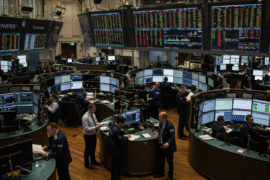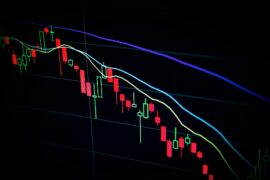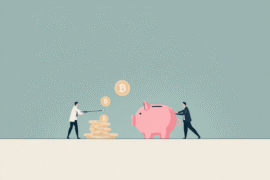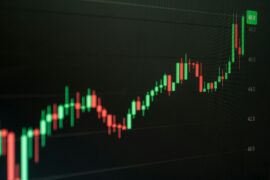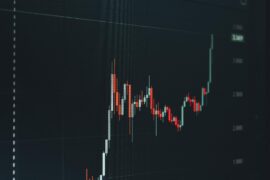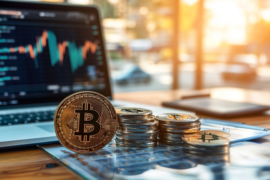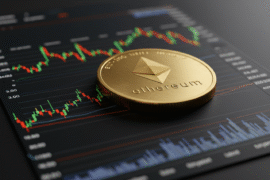This article may contain references to products or services from one or more of our advertisers or partners. We may receive compensation when you click on links to those products or services. Nonetheless, our opinions are our own.
The information presented in this article is accurate to the best of our knowledge at the time of publication. However, information is subject to change, and no guarantees are made about the continued accuracy or completeness of this content after its publication date.
- Euro Value Drop Driving Forces and Economic Signals in the Eurozone
- Factors Behind the Euro Fluctuations
- Euro fluctuations background
- Currency futures explained
- Reasons to trade currency futures
- Current euro climate
- Economic reports and market movers
- Approach to the currency market
- Features and benefits of euro currency futures
- Final thoughts
- Frequently Asked Questions
- What factors are contributing to the recent decline of the euro?
- How do currency futures work for the euro?
- What predictions are analysts making about the euro’s future value?
- How can investors protect themselves from the euro’s volatility?
- What role do geopolitics play in the euro’s performance?
- Are there any historical precedents for the euro’s current situation?
- What should casual investors consider before engaging with euro futures?
- Recommended Reads
Euro Value Drop Driving Forces and Economic Signals in the Eurozone
The euro has recently experienced a notable decline in value against major global currencies such as the U.S. dollar. This depreciation reflects several interconnected factors. Economic indicators, the prevailing political climate, and significant global events collectively influence currency valuations. The euro’s current position below critical support levels signals deeper underlying issues within the Eurozone’s economic landscape. Sluggish economic growth, persistent inflationary pressures, and ongoing debates surrounding interest rate policies by the European Central Bank (ECB) all contribute to this challenging environment.
Economic indicators serve as barometers for assessing the health of an economy, and their influence on the euro’s value is profound. These metrics offer a comprehensive view of economic performance, directly impacting investor confidence and currency strength.
Factors Behind the Euro Fluctuations
According to the European Central Bank (2025), the euro’s value is affected by several things. These include how well the Eurozone’s economy is doing, inflation, and global political events. High inflation and slow economic growth in the Eurozone have weakened the euro. Investors are also paying close attention to changes in the European Central Bank’s policies. The recovery from the COVID-19 pandemic has been uneven, which has made investors uncertain. Additionally, political instability and differences between EU countries add to the unpredictability, causing the euro to fluctuate against currencies like the U.S. dollar.
Gross Domestic Product (GDP) growth
When the GDP of the Eurozone experiences subdued growth, it often erodes confidence in the euro. A stagnant or declining GDP indicates a lack of economic expansion, which can deter foreign investment and weaken the currency’s appeal.
Unemployment rates
Elevated unemployment rates within the Eurozone signify a reduction in consumer spending power. This directly affects overall economic activity, leading to a decrease in demand for goods and services, which in turn can negatively impact the euro’s valuation.
Inflation rates
If inflation rates outpace wage growth, consumers face diminished purchasing power. This scenario can create economic instability and erode trust in the currency, making the euro less attractive to investors. The interplay of these indicators provides a clear picture of the euro’s potential trajectory.
Euro fluctuations background
The landscape of currency trading is inherently dynamic, and the euro’s journey over recent years has been shaped by a series of impactful global events. From significant political shifts to widespread economic disruptions, these occurrences have collectively influenced the euro’s value.
Brexit factor
The United Kingdom’s decision to exit the European Union, commonly known as Brexit, introduced a significant degree of uncertainty across various sectors. This historic event raised concerns about future trade relationships, regulatory frameworks, and migration patterns, contributing to investor apprehension and a subsequent shift of capital away from the euro.
Pandemic aftermath
The COVID-19 pandemic left an indelible mark on global economies, and its lingering effects have created an uneven recovery across the Eurozone. While some member states, like Germany, demonstrated resilience, others grappled with substantial economic challenges. This disparity in recovery rates has exerted additional pressure on the euro’s value.
Currency futures explained
Understanding the concept of currency futures is vital when considering strategies related to the euro’s performance. A currency future is a standardized contract that obligates one party to buy and another to sell a specific amount of a given currency at a predetermined price on a future date.
Voted "Best Overall Budgeting App" by Forbes and WSJ
Monarch Money helps you budget, track spending, set goals, and plan your financial future—all in one app.
Get 50% OFF your first year with code MONARCHVIP
Reasons to trade currency futures
Trading currency futures offers distinct advantages for various market participants. These contracts provide mechanisms for both risk mitigation and speculative opportunities.
Hedging
Businesses engaged in international transactions, particularly those involving the euro, can utilize currency futures to hedge against adverse exchange rate movements. This strategy helps to lock in a favorable exchange rate, thereby protecting profit margins from currency volatility.
Speculation
For traders and investors, currency futures present an avenue to capitalize on anticipated fluctuations in currency values. By accurately forecasting currency movements, participants can enter into contracts that yield profits as the exchange rate shifts. However, speculating on the euro’s future value requires careful analysis due to the numerous influencing factors that can change rapidly.
Current euro climate
The question of how much further the euro might decline remains complex and often debated among financial analysts. While various analytical tools are employed to make informed projections, these remain predictions rather than certainties.
Analyst consensus
Discussions among financial analysts often suggest that the euro may stabilize within a specific range before exhibiting a definitive upward or downward trend. This equilibrium is delicate; continued inflation outpacing wage growth or escalating political instability could lead to further depreciation. Conversely, shifts in European Central Bank policies aimed at curbing inflation or fostering economic improvement could trigger a turnaround. Investor perception and confidence are paramount in shaping the euro’s prospects.
Economic reports and market movers
Staying informed about specific economic reports and global events is important for anyone monitoring the euro’s trajectory or considering currency futures. These elements can significantly influence market sentiment and currency valuations.
What to watch
Several indicators and events warrant close attention to understand the euro’s potential movements. Monitoring these factors can provide valuable insights into market dynamics.
European Central Bank (ECB) statements
Announcements and policy changes from the ECB directly impact the euro’s value. Investors closely scrutinize these statements for indications regarding interest rates, quantitative easing, or other monetary policy adjustments.
Economic reports
Regularly reviewing economic reports such as GDP, unemployment rates, and inflation figures for the Eurozone provides a comprehensive understanding of the region’s economic health and its implications for the euro.
Global events
Geopolitical tensions, international trade agreements, and natural disasters can trigger sudden shifts in market sentiment. These events have the potential to disrupt established trends and lead to significant currency fluctuations.
Approach to the currency market
For those new to trading currency futures, adopting a structured and informed approach is vital. A methodical strategy can mitigate risks and enhance the likelihood of favorable outcomes.
Understanding the market
Familiarize yourself with the fundamental mechanics of currency trading. Dedicate time to researching various trading strategies, especially those pertinent to currency pairs involving the euro.
Using demo accounts
Many trading platforms offer demo accounts, which provide a risk-free environment to practice trading strategies. This allows users to gain practical experience and understand market dynamics without financial exposure.
Staying informed
Actively engage with financial news by subscribing to newsletters, participating in forums, and following reputable market analysts. The more comprehensive your knowledge base, the better equipped you will be to make well-informed trading decisions.
Setting clear goals
Define your investment objectives clearly. Determine whether your aim is long-term capital appreciation or short-term speculative profits, as this will influence your trading strategy and risk tolerance.
Patience is vital
Avoid making impulsive decisions based on short-term market fluctuations. Patience is a valuable asset in trading, allowing for more considered and strategic moves.
Features and benefits of euro currency futures
Euro currency futures offer specific features and benefits that appeal to a range of market participants. These contracts provide standardized access to the euro market.
Liquidity and market access
Euro currency futures are typically traded on highly liquid exchanges, ensuring ease of entry and exit for participants. This liquidity facilitates efficient price discovery and allows for swift execution of trades. They also provide direct access to the euro market, enabling participants to manage their currency exposure or speculate on price movements.
Final thoughts
The euro’s future trajectory remains uncertain, yet this unpredictability underscores the importance of preparedness. Maintaining composure amidst market volatility, continuously expanding one’s knowledge base, and staying abreast of developments are critical components of a successful strategy. Whether engaging in currency futures trading or simply observing the economic landscape, vigilance and informed decision-making are paramount. While the euro may currently be experiencing a downturn, those who approach the market thoughtfully may uncover latent opportunities. The question of how low the euro will go is ultimately answered by time, but its journey promises to be dynamic and engaging. Cultivating curiosity and staying informed can empower individuals to manage the complexities of currency markets effectively.
Frequently Asked Questions
What factors are contributing to the recent decline of the euro?
Several factors are influencing the euro’s decline, including economic uncertainty in the Eurozone, contrasting monetary policies between the European Central Bank and the Federal Reserve, and geopolitical tensions that affect investor confidence.
How do currency futures work for the euro?
Currency futures are contracts that allow investors to buy or sell a specific amount of currency at a predetermined price on a future date. They are often used to hedge against fluctuations in currency values, allowing investors to speculate on the future movements of the euro against other currencies.
What predictions are analysts making about the euro’s future value?
Analysts are divided on the euro’s future. Some predict a further decline due to persistent economic challenges and the interest rate differential with the U.S. dollar, while others believe it may stabilize or strengthen depending on upcoming economic data and policy shifts from the European Central Bank.
How can investors protect themselves from the euro’s volatility?
Investors can manage exposure to the euro’s volatility through diversification, using currency hedging strategies, or investing in financial instruments that are less sensitive to currency fluctuations.
What role do geopolitics play in the euro’s performance?
Geopolitical events can significantly impact the euro’s performance. Instability in regions economically tied to Europe, trade relations, and political decisions within EU member countries can all lead to fluctuations in investor sentiment and, consequently, the euro’s value.
Are there any historical precedents for the euro’s current situation?
Yes, the euro has experienced similar downturns in the past, particularly during economic crises or periods of high inflation. These historical events often provide insight into potential recovery patterns or further declines based on the underlying economic conditions.
What should casual investors consider before engaging with euro futures?
Casual investors should consider their risk tolerance, the economic landscape, and their understanding of currency markets before engaging with euro futures. It’s also advisable to stay informed on macroeconomic indicators and seek professional advice if necessary.

Reviewed and edited by Albert Fang.
See a typo or want to suggest an edit/revision to the content? Use the contact us form to provide feedback.
At FangWallet, we value editorial integrity and open collaboration in curating quality content for readers to enjoy. Much appreciated for the assist.
Did you like our article and find it insightful? We encourage sharing the article link with family and friends to benefit as well - better yet, sharing on social media. Thank you for the support! 🍉
Article Title: Euro’s Decline: Causes, Futures, and Market Navigation
https://fangwallet.com/2025/07/27/euros-decline-causes-futures-and-market-navigation/The FangWallet Promise
FangWallet is an editorially independent resource - founded on breaking down challenging financial concepts for anyone to understand since 2014. While we adhere to editorial integrity, note that this post may contain references to products from our partners.
The FangWallet promise is always to have your best interest in mind and be transparent and honest about the financial picture.
Become an Insider

Subscribe to get a free daily budget planner printable to help get your money on track!
Make passive money the right way. No spam.
Editorial Disclaimer: The editorial content on this page is not provided by any of the companies mentioned. The opinions expressed here are the author's alone.
The content of this website is for informational purposes only and does not represent investment advice, or an offer or solicitation to buy or sell any security, investment, or product. Investors are encouraged to do their own due diligence, and, if necessary, consult professional advising before making any investment decisions. Investing involves a high degree of risk, and financial losses may occur including the potential loss of principal.
Source Citation References:
+ Inspo
European Central Bank. (2025). Monetary Policy and Economic Stability. https://www.ecb.europa.eu/ International Monetary Fund. (2025). Euro Area: Outlook and Risks. https://www.imf.org/en/Regions/Europe













